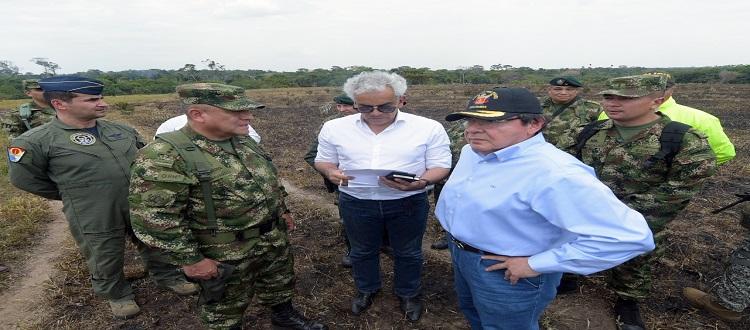In compliance with its constitutional mandate and the Defense and Security Policy for Legality, Entrepreneurship and Equity by President Iván Duque, during the last days the Military Forces and the National Police, in coordination with the Attorney General's Office, the Ministry of Environment and Sustainable Development, Natural National Parks and IDEAM, carried out the fourth phase of Operation Artemisa at the limits of the departments of Meta and Caquetá, in the Tinigua Natural National Park.
The Minister of Defense, Holmes Trujillo, accompanied by the Minister of Environment, Ricardo Lozano, arrived in the area where the operation was carried out, along with the director of Natural National Parks, Julia Miranda; the general commander of the Military Forces, General Luis Fernando Navarro, and the director of the National Police Police Directorate; General Hermán Alejandro Bustamante.
Minister Holmes Trujillo announced that during the operation control of approximately 1,900 hectares of the national park Tinigua deforested was retaken. In addition, 20 people, 8 women and 12 men, were captured for alleged environmental crimes, and the rights of 5 minors will be restored. Now, these children are under the protection of the Children and Adolescents Police and will be put into custody of the Colombian Institute of Family Wellbeing.
The head of the Defense said that the Security forces "are committed to recovering the damage caused by deforestation, a process that can take by 7 or 10 years to have sufficient forest cover that allows the return of some types of animals."
He was in the same way emphatic in affirming that the Military Forces and the National Police have “the constitutional mandate, as well as the clear and express order from President Iván Duque, to defend and protect water, biodiversity and the environment, which is recognized for the first time as a topic of national interest, priority and as a matter of national security”.
For this reason, Minister Holmes Trujillo remembered the very serious consequences of the invasion of areas of special ecological importance and deforestation, because “it annihilates the flora and fauna, threatens animals such as the anteater and the royal parrot, and ends with our water sources”.
He said that behind the deforestation of the Tinigua Natural National Park are the residual Organized Armed Groups that criminally seek to use these protected areas “as base areas and mobility routes for criminal activities, which endanger not only strategic resources of the Nation, but life, the good physical condition and the rights of the communities ”.
He added that these GAO-r "are deforesting to plant coca, to continue killing and ending the environment, continue to destroy and pollute water sources" and pointed out that “it is what drug trafficking does, so here what you have to do is to fight drug trafficking so that all Colombians can live and work in peace.”
For his part, the Minister of Environment, Ricardo Lozano, highlighted the importance of the operations to fight against deforestation and for the legality through the National Council to Combat Deforestation - CONALDEF- and the Operation Artemisa for the protection of our Natural and global heritage such as the National Natural Parks.
He added that the Tinigua Natural National Park is essential for the lives of Colombians, because “it combines the ecosystems of the Andean, Amazonian and Orinoquia regions. Here the water is provided to Bogotá and the central region, for example, and in the same way if we protect and restore the ecological function of these Amazonian parks we will have safe water in the dry seasons. ”
The operation led by the Security forces, with about 22,300 men and women, led to approximately 240 military operations being carried out in 2019 in support of the Ministry of Environment, Natural National Parks and IDEAM, among other institutions, recovering more than 3,500 hectares of forests and Natural National Parks.





